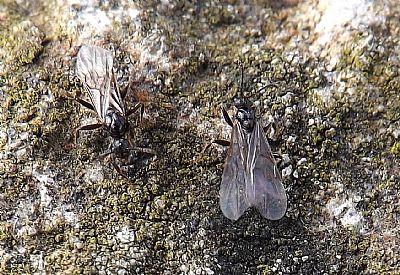ANTS
There are over fifty species of ant found in the UK. We don't seem to often see ants in West Dunbartonshire, but having said that, when we do, we see a lot of them roughly in one spot. And even then we under appreciate the complexity and significance of their little lives.
COMMON BLACK GARDEN ANT : lasius niger.
You most likely know this ant to some extent. It not only lives in your garden, but may enter your house. This ant nests under pavements, in soil and along the edges of lawns. In fact almost anywhere.
The Antnest website tells us that It is a very quick, robust and prolific ant, using formic acid and its jaws as a means of attack/defence. Its colonies can grow up to a size of 15,000 workers, though about 4000 to 7000 is perhaps the average.
The ants of this species eat insects, nectar, and even the bodies of their own dead, or ants from other colonies. Lasius niger are also very fond of sugary substances. Their diet consists of a variety of insects including flies, beetles, the larvae of various flies and beetles, fruit and honeydew.
Although common as an earthbound ant, it develops wings during the mating season. Seeing a horde of "flying ants" emerge is quite a site. The winged insects you see are almost always the sexually mature queens and males of the black garden ant, Lasius niger. The larger ants are the queens. They can be up to 15mm long. [NHM].
During the winged phase they may be mistaken for flies such as St Mark's fly, Bibio marci, or even a species of black methocha wasps. Look for their long antennae.

Just two of many fling ants emerging from a crevice in a rock of Carman Hillfort. If you look closely you will see that their wings are a little crinkled and not yet fully explanded, but once in the air they managed to get in the hair and down the shirt collar. Their moment of flight, triggered by weather conditions, signals when they take to the air simultaneously in search of mates from other colonies.
ANTNEST : https://www.antnest.co.uk/lasius-niger/
DAILY RECORD : https://www.dailyrecord.co.uk/lifestyle/flying-ant-day-phenomenon-sweeps-30666652
NATURAL HISTORY MUSEUM : https://www.nhm.ac.uk/discover/when-why-winged-ants-swarm-nuptial-flight.html

